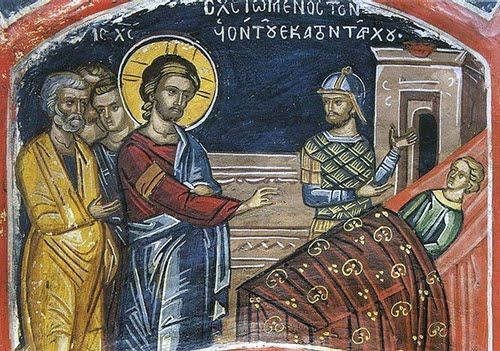Message of Abbot Paul - Monday - 11th March 2024
Abbot Paul • March 10, 2024


On Saturday I wrote about forgiveness, including the forgiving of our enemies and of those who have wronged us in any way. Then on Saturday, celebrating Mass at Leominster, I used the Second Eucharistic Prayer of Reconciliation and found these powerful words in the Preface. All this is the saving work of Christ in our hearts, when we turn to him and follow the promptings of the Holy Spirit. What a tremendous gift forgiveness is, both accepting and bestowing forgiveness.
For though the human race
is divided by dissension and discord,
yet we know that by testing us,
you change our hearts
to prepare them for reconciliation.
Even more, by your Spirit you move human hearts
that enemies may speak to each other again,
adversaries may join hands,
and peoples seek to meet together.
By the working of your power
it comes about, O Lord,
that hatred is overcome by love,
revenge gives way to forgiveness,
and discord is changed to mutual respect.
Today’s Gospel passage comes from John, (Jn 4: 43-54), the healing of a court official’s son. Unlike the three Synoptic Gospels, John only reports a selected few of Jesus’ miracles as signs of his divinity. He never calls them miracles, as this would put Jesus on a par with other miracle workers, but signs. Jesus has returned to Cana in Galilee, “Jesus left Samaria for Galilee. He himself had declared that there is no respect for a prophet in his own country, but on his arrival the Galileans received him well, having seen all that he had done at Jerusalem during the festival which they too had attended. He went again to Cana in Galilee, where he had changed the water into wine.” It’s here, in Cana, that he receives a visit from a court official from Capernaum, some 16 miles’ away, today a short car trip, but then a full day’s walk or more. This gives us some indication of the fame of Jesus in Galilee. “Now there was a court official there whose son was ill at Capernaum and, hearing that Jesus had arrived in Galilee from Judaea, he went and asked him to come and cure his son as he was at the point of death.” This is the first occasion in John on which Jesus is asked to cure a sick person, and it’s a child. No indication is given of the type of illness nor is mention made of evil spirits. These details are omitted as probably unimportant to John. To begin with, Jesus doesn’t answer kindly. “Jesus said, ‘So you will not believe unless you see signs and portents!’” But the man is more interested in his sick boy than in an argument about signs and portents. “‘Sir,’ answered the official ‘come down before my child dies.’” Jesus can see his desperation, as well as his faith. “‘Go home,’ said Jesus ‘your son will live.’”
At this point in the account, we begin to grasp its meaning. “The man believed what Jesus had said and started on his way; and while he was still on the journey back his servants met him with the news that his boy was alive. He asked them when the boy had begun to recover. ‘The fever left him yesterday’ they said ‘at the seventh hour.’ The father realised that this was exactly the time when Jesus had said, ‘Your son will live’; and he and all his household believed.” Once Jesus has spoken, the man takes him at his word and starts out for Capernaum. He believes in the word of Jesus. Faith is trusting in the word of God and in his goodness. The result of the healing is that both he and his household believe, they come to faith in Jesus. We are told no more and don’t meet up with the family again, but they must have been counted among the first followers of Jesus, the very first Christians. John simply concludes by saying, “This was the second sign given by Jesus, on his return from Judaea to Galilee.” Lord, may the signs of your presence in our lives bring us to a
deeper faith in you this Lent. Amen.









